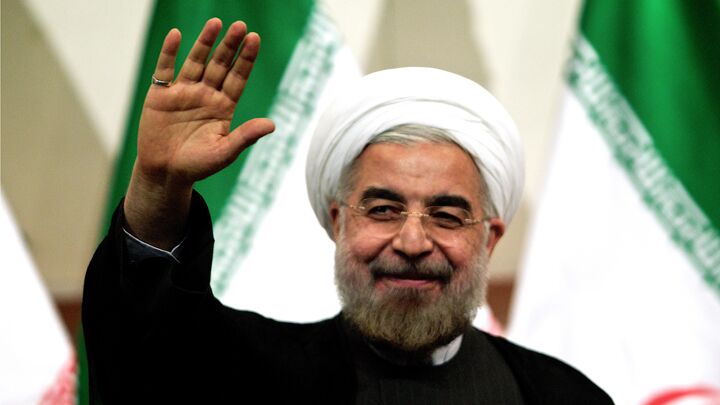
Iran’s New President: Is Hassan Rouhani the Moderate the West Hopes For?
No longer is the Iranian presidency headed by a bombastic, loose-lipped anti-Semite who is openly committed to the demise of the West. According to much of the Western media, President-elect Hassan Rouhani, unlike his predecessor Mahmoud Ahmadinejad, is a “moderate” and a “reformist” who will alter the defiant course of the Islamic Republic.
But looks can be deceiving.
Rouhani won the Iranian presidential election with a fraction above 50 percent of the vote. Representing the “moderates,” he soared on the support and endorsements of “moderate” former presidents Mohammad Khatami and Akbar Hashemi Rafsanjani. Rouhani’s hardliner opponents split the vote among themselves and performed dismally, leaving the Shiite cleric victorious. This has been seen as a victory for the “moderates” in Iran.
But how much can you read into an election engineered by the ayatollah, who decided who would run and how many “moderates” and “hardliners” would run?
Despite being labeled as a moderate, Hassan Rouhani was one of the eight candidates handpicked by Ayatollah Khamenei. True, some of Iran’s mullahs would have preferred a hardliner like Saeed Jalili, but Rouhani may prove to be a far better president for the clerics in Iran, to whom he’s well connected. According to the popular Cranmer blog, Iran’s new president is a devout believer in the apocalyptic Twelfth Imam, as was Ahmadinejad. Rouhani’s main advantage is the “reformist” cloak that he dons, both for the Iranian public and the international community.
Texas-based think tank Stratfor noted: “Following four years of fractious infighting between Supreme Leader Ayatollah Ali Khamenei and outgoing President Mahmoud Ahmadinejad, Rouhani’s election helps safeguard against public unrest and presents the West with a presumably more conciliatory Iranian president” (June 15).
Under Ahmadinejad’s tumultuous second term, power struggles saw the Islamic Revolutionary Guard Corps rise in influence to counter him, but they did so to the detriment of the clerics’ clout, observes Stratfor. With Rouhani, there won’t be Ahmadinejad-like defiance, and the balance of power will shift more heavily toward the clerics—specifically, Ayatollah Khamenei.
On the international front, Hassan Rouhani is being widely viewed as a pragmatist whom the international community can engage in meaningful dialogue. His “reformist” image may be significant in helping ease the economic sanctions Iran faces. He was, after all, Iran’s chief negotiator with the West for its nuclear program from 2003 to 2005. In 2003, he successfully reached a deal with the European Union for Iran to suspend its uranium enrichment, and at that time he called the deal a “victory of moderation and a victory of commitment over extremism.” Unfortunately, enrichment never stopped. And Rouhani was well aware of the fact.
After leaving his nuclear negotiator post, Rouhani gave a speech in 2006 in which he openly admitted to duping the international community. He said, “While we were talking with the Europeans in Tehran, we were installing equipment in parts of the facility in Isfahan, but we still had a long way to go to complete the project. In fact, by creating a calm environment, we were able to complete the work on Isfahan.”
Hassan Rouhani thus combines the same duplicitous nature of Iran’s mullahs with the tact and moderate face of a reformist, in contrast to the brazen demeanor of Ahmadinejad. This makes him the perfect president for the clerics—and potentially a deadly adversary of the West.
The Langley Intelligence Group Network surmised on June 17:
Rouhani’s win may be an attempt by the Iranian regime to find a replacement for Ahmadinejad with a softer, more moderate image …. Khamenei probably plans to use Rouhani’s softer image to mount an international campaign to improve Iran’s image in the West and promote international trade. Signs that such a campaign could succeed are already apparent with the strong positive Western media coverage of Rouhani’s election and its depiction of him as a moderate. With Rouhani serving as Iran’s chief diplomat, he may be welcomed more openly in many capitals around the world, making it more difficult for the United States and its allies to maintain the increasingly tight noose of economic sanctions that have been imposed on Iran in recent years. Rouhani’s more acceptable image may also complicate efforts to pursue coercive measures, including the use of force, should sanctions fail to prevent Iran’s nuclear advances.
The truth about Iran’s new president informs us that the world still has a dangerous Iran to contend with. Indeed, Iran may even be more deadly because of the “moderate” label its president now has. Whatever the nature of his leadership, it will be subservient to that of Iranian Supreme Leader Ayatollah Khamenei, who alone controls nuclear and foreign policy.
Bible prophecy reveals that Iran will continue its dangerously belligerent path. But Daniel 11:40 shows that one day, Iran will be stopped from without, by a European “king of the north.” For more on this subject, read our free booklet The King of the South. You may also be interested in a sidebar in our August 2005 Trumpet issue titled “Khatami Was No Slouch.”
